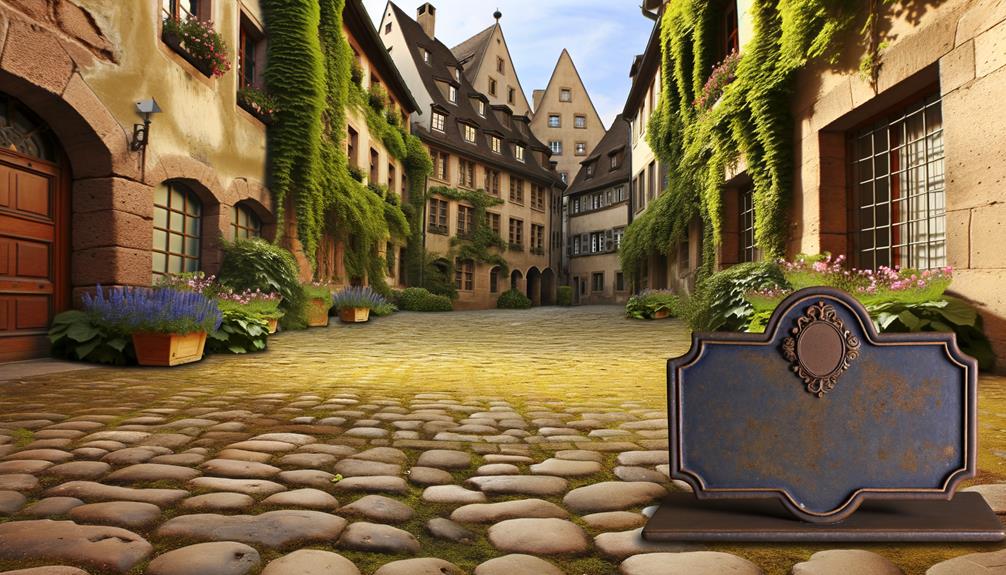The Meaning of the Name Marcel
The name Marcel originates from Latin Marcellus, a diminutive form of Marcus, associated with Mars, the Roman god of war. This etymology highlights martial heritage, strength, and valor.
Historically prominent in the Roman Empire and medieval Europe, Marcel symbolizes leadership and resilience. Its cultural significance is enriched by notable figures like novelist Marcel Proust and mime Marcel Marceau.
Maintaining a steady presence, Marcel ranks within the top 1,000 names for boys in several countries, thanks to its classic nature and ease of pronunciation. Discover how the name's cultural and historical facets enhance its enduring appeal.

Key Takeaways
- Marcel originates from the Latin name Marcellus, a diminutive form of Marcus.
- The name is associated with the Roman god of war, Mars, reflecting strength and valor.
- Marcel has historical roots in Europe, enduring since the Middle Ages.
- Notable figures like Marcel Proust and Marcel Marceau enhance the name's cultural significance.
- It remains popular due to its classic nature and ease of pronunciation.
Origins of Marcel
The name Marcel originates from the Latin name Marcellus, which itself is a diminutive form of Marcus, a name often associated with the Roman god of war, Mars. The etymology underscores a strong martial heritage, reflecting attributes such as strength and valor.
Historical records indicate the usage of Marcel in various European regions, particularly in France and Germany, since the Middle Ages. The name's endurance over centuries highlights its adaptability and the cultural exchanges that facilitated its proliferation.
Linguistically, the shift from Marcellus to Marcel illustrates a linguistic simplification common in the evolution of names. This transformation underscores the dynamic nature of language and its role in shaping identity through nomenclature.
Cultural Significance
Marcel's historical roots and linguistic evolution are mirrored in its rich cultural significance across various societies. The name has been a symbol of cultural identity and influence, embodying various nuanced meanings:
- Literature: Marcel Proust's monumental work, 'In Search of Lost Time,' has cemented the name in literary history.
- Cinema: Marcel Marceau, the renowned mime artist, has influenced performance arts worldwide.
- Music: Marcel Mule, the influential saxophonist, has had a significant impact on classical music.
- Religion: Saint Marcel, a revered figure in Christian hagiography, represents piety and perseverance.
These examples demonstrate how the name Marcel transcends mere nomenclature, embedding itself deeply into the cultural and intellectual fabric of society.
Historical Usage
Tracing back through centuries, the usage of the name Marcel reveals a profound historical trajectory shaped by diverse cultural and socio-political influences. Initially rooted in Latin origins, Marcel gained prominence during the Roman Empire, symbolizing martial prowess. The name saw a resurgence in medieval Europe, particularly within French nobility, where it signified strength and leadership. By the 19th century, Marcel became prevalent in literary and artistic circles, reflecting intellectual sophistication. Each era's distinct socio-political milieu heavily influenced Marcel's adoption and usage.
| Period | Key Influences |
|---|---|
| Roman Empire | Martial prowess |
| Medieval Europe | Nobility, leadership |
| 19th Century | Literary and artistic use |
| Early 20th Century | Intellectual sophistication |
| Contemporary Era | Diverse cultural adoption |
This historical context underscores the name's dynamic evolution.
Famous Marcels
Examining the name's impact through history naturally leads us to ponder the notable individuals who have borne the name Marcel, each contributing to its rich legacy.
An in-depth analysis reveals a diverse set of distinguished figures:
- Marcel Proust – A seminal French novelist best known for 'In Search of Lost Time,' Proust's profound literary contributions shaped modernist literature.
- Marcel Duchamp – An influential artist whose avant-garde works, including 'Fountain,' revolutionized 20th-century art.
- Marcel Cerdan – A prominent French boxer, Cerdan's remarkable career in the ring left an indelible mark on sports history.
- Marcel Marceau – The renowned mime artist whose pioneering performances brought the art of mime to international acclaim.
These individuals exemplify the name's enduring cultural and historical significance.
Modern Popularity
In contemporary times, the name Marcel maintains a steady presence across various cultures, reflecting its enduring appeal and versatility.
Statistical data indicates that Marcel consistently ranks within the top 1,000 names for boys in several countries, including France, Germany, and Poland. This persistence can be attributed to its classic nature and ease of pronunciation in multiple languages.
Moreover, the name's association with notable historical figures and cultural icons bolsters its attractiveness. Parents seeking names that are traditional yet not overly common often gravitate towards Marcel.
The name's adaptability in diverse linguistic environments underscores its global resonance, ensuring its continued relevance in the modern era. Current patterns suggest a stable, albeit modest, popularity that transcends temporal and geographical boundaries.
Conclusion
The name Marcel, rooted in Latin origins, has traversed centuries, embodying cultural and historical significance across various societies. Its usage, echoing through the annals of time, reflects a tapestry woven with notable individuals and evolving popularity.
The name has been carried by luminaries in arts and politics, further cementing its place in modern contexts. Like a river flowing through diverse landscapes, Marcel continues to adapt and thrive, maintaining its resonance and relevance in contemporary times.






